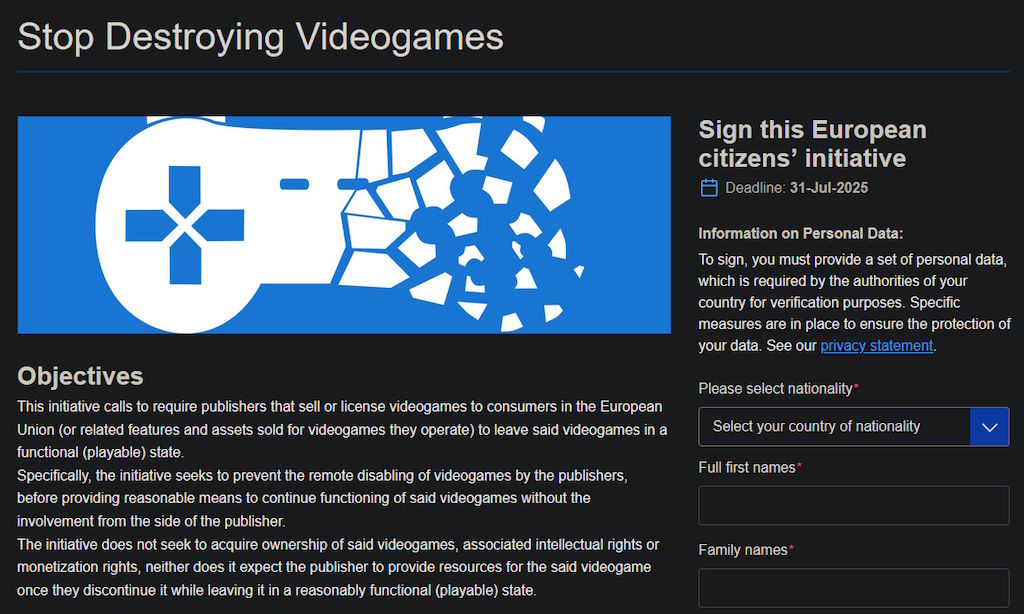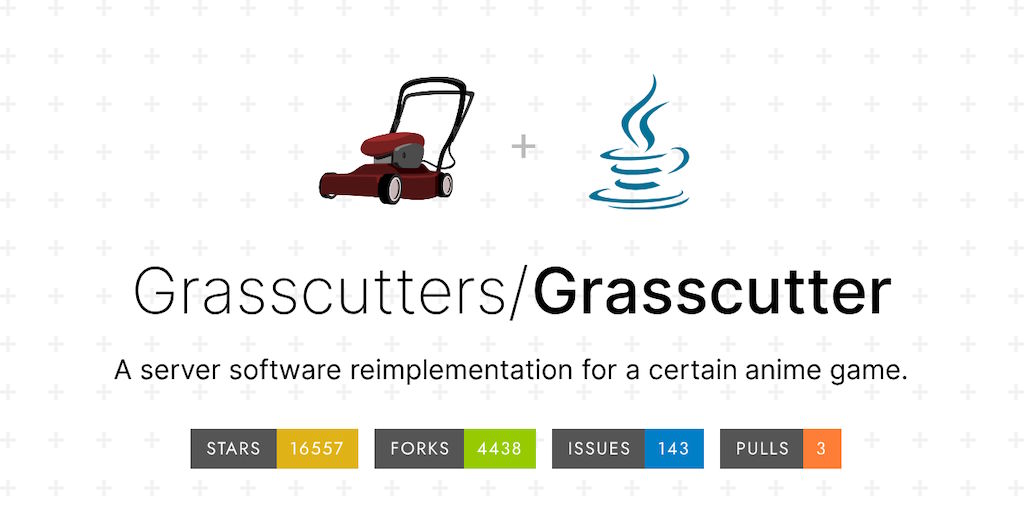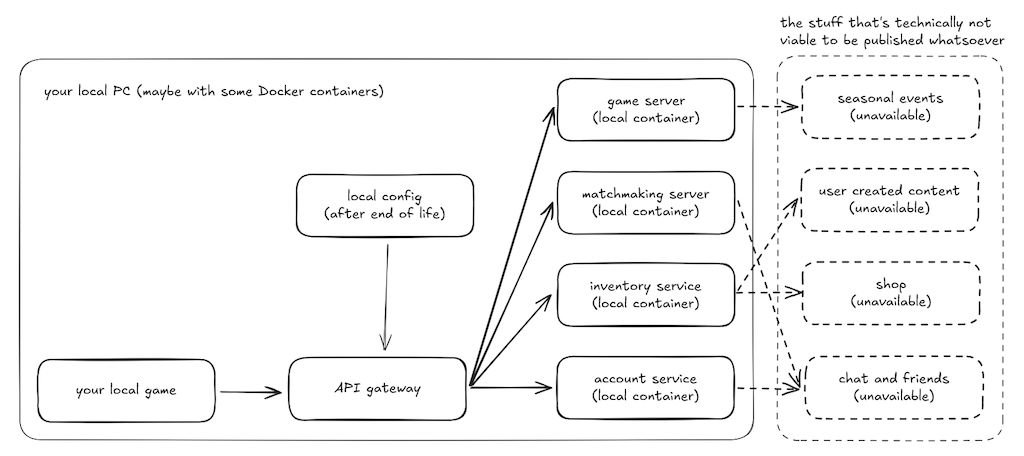Stop killing games and the industry response
Date:
Recently, there's been a European Citizens' Initiative called "Stop Destroying Videogames" which by now has hit the milestone of 1'000'000 signatures. You're still encouraged to sign it if you care about its goals and are a EU citizen, since not all of those are likely to be valid signatures, but overall this is a pretty positive trend:

If it does indeed get enough valid signatures, it will get passed on to the European Commission and new laws might get passed as a consequence. However, there has been some opposition to it, so today I'd like to briefly describe what it's about, as well as why some of the people disagree with it, and why they might be quite wrong in doing so.
Why are video games being killed
First up, the actual objectives are pretty concise, here they are:
This initiative calls to require publishers that sell or license videogames to consumers in the European Union (or related features and assets sold for videogames they operate) to leave said videogames in a functional (playable) state.
Specifically, the initiative seeks to prevent the remote disabling of videogames by the publishers, before providing reasonable means to continue functioning of said videogames without the involvement from the side of the publisher.
The initiative does not seek to acquire ownership of said videogames, associated intellectual rights or monetization rights, neither does it expect the publisher to provide resources for the said videogame once they discontinue it while leaving it in a reasonably functional (playable) state.
It was all more or less kicked off by a YouTube creator named Accursed Farms, who illustrated why this matters with the example of the game The Crew:

So what does this mean on a practical level?
Suppose you bought a game like The Crew back when it came out, in 2014. The game is about racing around in cars and can be played both in singleplayer modes and multiplayer modes, with other players. However, the game is made in such a way, that the account management functionality depends on servers, hosted by Ubisoft. This means that once some time passes and supporting those servers is no longer viable (once that AWS bill starts racking up and there are no new sales), Ubisoft is going to turn them off, just like they did in 2024, making the game unplayable.
Even the singleplayer components: you just wanting to race around cars in a world with you and other NPCs in it, is no longer viable. Essentially, you didn't "buy" the game, but in a sense were "renting" it for an indeterminate amount of time, a lease that expired due to the publishers and developers no longer wanting to provide that service for you. Yet, it wasn't marketed to you as a subscription, you thought that you were buying something, but were instead just being misled.
I don't think that's acceptable, not even remotely. Objectively, there are also no good reasons (there are reasons, just not good ones) for things to be that way: singleplayer games in general have been around for decades. If Need for Speed 2: SE could do that back in 1996 (which was my first racing game that I played years and years after its initial release on my dad's old work laptop), then surely there's no good reason for the comparably huge corporations of the current day and age to be unable to do so either:

To sum up what I think should happen, is being upfront when a game is online only and calling it a subscription, something that would be relatively easy to implement (and is often already supported) in all online stores. You don't have to re-architect your entire game if you don't want to say that you are letting people buy it. You can just call it what it is, a subscription.
Similarly, you can sell a singleplayer game with optional multiplayer components: if I have a PC with no Internet connection and if it stayed that way for a decade, the singleplayer components should still work. On the other hand, if you want to sell a game that would otherwise be online only, you need to make it so that once you end your support for it, there must be a way for people to keep playing what they bought. I'll get into some of the ways how to do that later.
That's it. But clearly there's lots of pushback.
The industry response
Once the initiative reached its initial signature goal, there was a statement released by Video Games Europe, an association of a bunch of video game publishers in Europe. First up, it's cool that organizations like that exist, that there's a decent video game industry in the EU as well and some organization around the craft. Secondly, I don't quite agree with the statement, but understand their concerns.
So here it is:
We appreciate the passion of our community; however, the decision to discontinue online services is multi-faceted, never taken lightly and must be an option for companies when an online experience is no longer commercially viable. We understand that it can be disappointing for players but, when it does happen, the industry ensures that players are given fair notice of the prospective changes in compliance with local consumer protection laws.
Private servers are not always a viable alternative option for players as the protections we put in place to secure players’ data, remove illegal content, and combat unsafe community content would not exist and would leave rights holders liable. In addition, many titles are designed from the ground-up to be online-only; in effect, these proposals would curtail developer choice by making these video games prohibitively expensive to create.
We welcome the opportunity to discuss our position with policy makers and those who have led the European Citizens Initiative in the coming months.
Remember how I said that there are no good reasons? Well, they list off some of the bad reasons for being opposed to what the initiative stands for. Let's cut out the fluff, we don't care about how carefully they deliberate before making us unable to play a game that we paid for, while thinking that we were buying something. I don't care about what they believe is a "fair notice" because I'm opposed to the practice in general. The consumer protection laws need to be amended, that's the whole point.
Private servers are ALWAYS a viable alternative option for anything that needs to talk to a server in an otherwise singleplayer experience.
If a bunch of nerds could sneakily get together and create a private server implementation for a huge game like Genshin Impact, purely be reverse engineering the network traffic, then surely the first party developers should have no issue doing that either:

Curiously, they later stopped supporting it, hopefully not due to under the board legal threats, but in the case of "dead" games like Battlefield: Bad Company 2 there have also been initiatives like Project Rome and similar ones. When the game developers act like scumbags and claim supporting the game is no longer possible, the community proves them wrong with simple emulation and redirecting network traffic:

So, why the opposition? It's because their development practices are crap. They complain that there's content moderation systems and middleware that they cannot expose. Make those optional, then. For example, user created skins don't need to be in the singleplayer version of the games. Something like leaving behind items in the world like in Death Stranding doesn't also need to be there in a fully singleplayer game. You just need to let the players have the core experience, or alternatively, export whatever data you can at the end of the game's lifecycle and provide that as a static dump (e.g. messages left by players in something like Dark Souls).
Furthermore, the claim that many games are designed from the bottom up to be online only: I'm not responsible for your poor architecture decisions. You follow the laws we make, not the other way around. If you complained that it's too hard to hash the passwords entered by your users or to encrypt medical data, or that you don't feel like complying with GDPR, you'd get rightfully fined out of existence. Furthermore, the fact that pretty much most software can now be packaged and run in a Docker container is kind of embarrassing for you. You think the developers really can't be bothered to build their server software and even give the players a distribution ZIP file (or even the source code) and just provide a way to make your local game talk to something that's running locally?
No, the thing is that they just don't want to. But it doesn't matter what they want. Remember the principles of good software development: making your software modular? Degrading service gracefully when not all services are available (e.g. not being able to connect to chat shouldn't mean that you can't play a round in a game altogether)? Do more of that, ship whatever components you can to ensure the continuity of the core gameplay and let everything else fail gracefully:

Now in practice, obviously these can be more or less difficult depending on the game in question - sometimes developers go crazy with the amount of the services that a product needs, but just because you've made a mockery of the big ball of mud architectures of the olden day by implementing a big mess of services doesn't mean that publishing some of those after you end the support for a game is any less viable, your incompetence doesn't excuse that.
And if things are indeed that bad, that some of the core software you use is proprietary and that you cannot release it due to licensing issues, then either provide a simplified shim (e.g. we don't need some hyper-scalable account management solution, the same API that's backed by SQLite is more than enough), or just stop building products based on proprietary crap in the first place.
It's the same with various art assets, just look at UFO2000, a remake of the older X-COM game, that has its own (arguably placeholder) assets but can also import the official data files and swap out the placeholders as needed. If you as a developer have the license for some of your music or other assets expire, just replace them with blank MP3s or checkerboard pattern textures (or, you know, draw up your own BMWn't logo and texture in an afternoon for all I care) and let the community figure everything else out. Boxes on wheels with the gameplay that you love, that someone can fix later in Blender and have proper models for, beats having a dead game.
I don't quite enjoy Richard Stallman's personality due to all of the controversy that he's had over the years, but when it comes to talking about the ethics of software, his free software movement is right time and time again. Honestly at this point I'd even take source available, or just some stripped down binary release that keeps a game or other piece of software I need going, a bit like how I used the old Bvckup tool for the longest time ever, even after the end of support.
The Pirate Software controversy
There was also a video released by a popular creator named Pirate Software, which was quite critical of the initiative:

Since then, a lot of other people came out and critiqued both the arguments that he made in the video, alongside more personal attacks (one's ego shouldn't get in the way and you should admit when you're wrong, instead of doubling down; then again, we are all human). The video itself critiques the technical feasibility of whether this can be done and also blames it for being quite vague.
I will admit that the text of the initiative is indeed somewhat vague. Then again, it's not a law by itself, but just puts forth the bad industry practices for consideration. I have quite the negative take of the legal systems in general, where the letter of the law is supposed to be followed and enforced instead of the spirit of the law, which leads to a lot of issues when it's impossible to ever get the laws to be written down perfectly and without loopholes. That said, it doesn't mean that we shouldn't try to make things better at all! Nor does it mean that laws can't be improved down the road.
I will also say that he's spot on about the part where he suggests that the language around acquiring a game is a large part of the problem and that it should be addressed directly! That is also my problem with the state of the industry as I explained and something that should have definitely been a paragraph in the initiative, one of the main points of focus, as a matter of fact!
The rest of the critique isn't valid - you don't need to move from a client-server model, you just need to make a big enough subset of the server to be runnable either locally, or on a server that you control yourself. This is already the case with pretty much every Minecraft server out there and has worked as an approach for decades.
We don't need to be apologetic for the companies, or to claim that games having a low playerbase somehow justifies screwing over the few people who'd like to enjoy the game for a bit longer, even a decade later. The game preservation movement is largely against that sort of practice in the first place. It also doesn't mean that companies need to run their current live service games indefinitely, just do a proper job of sunsetting those games, instead of just pulling the plug.
I'm not sure whether the person is doing that for the sake of stirring up drama and views, whether they either misunderstand things or just focus on all the potential negatives (like I myself am guilty of doing, just look at my blog post about AI brainrot), but either way they're wrong. I do suspect foul play because someone with years of industry experience should know better, not spread misinformation about the technical feasibility of it.
I will concede that this might take additional months of development work, but that's just the cost of doing business, if you let your devs roam freely (or rather forced them into a particular architecture and coupling) and didn't, for example, put interfaces in front of your implementations. None of that would even be a problem if you just had a few meetings before the initial implementation even starts, since the curve of the costs of software changes has been known in the software development circles for decades.
The ugly truth
Let's suppose the initiative goes through and some well spirited EU law gets passed. You know what happens next?
The same thing that happened with GDPR, with cookie consent in particular, have a look at Dark Patterns after the GDPR: Scraping Consent Pop-ups and Demonstrating their Influence or maybe have a look at some of the dark patterns that were often knowingly employed by companies to coax users into submitting to whatever they want:
We scraped the designs of the five most popular CMPs on the top 10,000 websites in the UK (n=680). We found that dark patterns and implied consent are ubiquitous; only 11.8% meet the minimal requirements that we set based on European law.
You'd probably see the exact same trend in regards to games: packages that are unreasonably hard to compile, modes that are technically there but very much broken without supposedly optional online components, sometimes adding trash singleplayer modes for the sake of being able to say that you are selling a game instead of providing a subscription BUT having that mode be incredibly bad - similar to how in War Thunder there is the assault mode which just spawns dumb bots in waves that nobody really likes to play (despite being an otherwise great multiplayer game), compared to more competently done PvE in something like Armored Warfare, which has both PvE modes with better AI, as well as co-op campaigns.
It's not just about the difficulty in supporting games long term or the complexities of having to build modular software: it's very much about control.
If a game or any piece of software is easy to configure to run locally or swap out components in, then suddenly if you as a company do too many disagreeable things, then users have a choice not to do business with you. All of those microtransactions and lootboxes etc., suddenly you'd actually need to price them in ways where people are okay with paying for them, instead of having a more or less addicted playerbase that you hold hostage.
I actually use War Thunder as a silly example because it's a free to play game and you don't really buy it, but if they hypothetically decided to sell it to you for a one time payment, suddenly further premium vehicles that can sometimes cost close to 100 EUR would be a tough sell, when the community could come together and sneak in their own custom server implementations:

Why do I construct such an example? Because it already happened, with Escape From Tarkov. It is a live service game that you buy, with the Unheard Edition costing around 200 EUR and having PvE as one of the selling points, something that did get quite a bit of criticism online:

The thing is, the community wouldn't stand for this and there are projects right now that give you the ability to play Tarkov in singleplayer with a locally run and highly customizable server: SPT-AKI and not only that, but there's also a lively modding scene, which makes the game truly yours to play as you please. Want to turn the sweaty and difficult shooter into something where both you and bots can magdump each other from cover for a minute before anyone goes down, something closer to how those sorts of things actually work in reality? Sure thing!
The sudden problem there is that of course people made it reach its logical conclusion and there's also a mod that everyone's very hushed about, that actually allows you to play Tarkov in co-op with the custom server: Project Fika and suddenly, you don't need to pay around 200 EUR to have co-op, nor even buy the game at all to play it however you please. Yes, as it turns out, there are pirated versions (that I shall not link, as they're both illegal and not directly related to the aforementioned projects) where you can basically play a version of EFT that's better than the live service game that you don't control, in pretty much every way.
This is what happens when you give the ability to the players to control their experience: they will optimize it for their own enjoyment of the gameplay, instead of the company's need for monetization. Admittedly, some companies might even care about viewing games as both an enjoyable hobby and sometimes an art form, but they absolutely will use every trick in the book to fight against anything that hurts their bottom line - their ability to make money.
Thus, you'll see both the dark patterns mentioned above, as well as the (unfortunately true) allusions to how giving up any control might result in increased piracy. At the same time, I'm pretty sure that most people who actually play games do realize how harmful DRM is and why platforms like GOG are really nice in that regard, with their official DRM free releases.
Summary
I really wish people could do things in good faith. More games should have self-hostable servers. More games should have the source code released (yes, to the whole game and whatever assets the developers can release, with placeholders for everything else) once they are no longer supported. But this goes directly against the desires of publishers and developers - why would anyone give you money for a new release that's made arguably badly and mostly in the name of making fat stacks of money, versus an older version of the game that's lovingly kept alive by the community?
We end up with the disconnect between games as a product vs something closer to an art form, or a niche interest that builds a rich and passionate community around it, where the latter actually has the potential to both extend the life of a game and do great good for the developers: just look at how many mods Skyrim has, many of which make the game way more enjoyable even a decade after release (it was actually released in 2011, I feel old now):

Sometimes there are fixes for games that were rushed to release, like what happened to Vampire: The Masquerade - Bloodlines or even mods like Deus Ex: Revision which also expand on what could have been the original vision for the game, as well as restorinng content that was unfinished and cut from the original release.
At the same time, some of this definitely can hurt the business behind those games. That's why I think the mismatched incentives are quite unfortunate, but at the end of the day, consumers shouldn't be misled - if that means calling something a subscription when it clearly is one instead of a purchase, then so be it. Even if it's for an indeterminate amount of time (for how long the developers/publishers can and want to support it).
When it comes to the actual development, I think that the GNU people were once again correct: Service as a Software Substitute
If I have to integrate with your software (regardless of whether in a web development context, or something else) and you can't give me a test environment, a locally runnable Docker container, or even a simple statically compiled executable (Go is really great for this) that can run against SQLite or an embedded key-value store of your choice, I'm not going to be eager about being your friend.
Lastly, I think that the buy vs subscribe distinction should apply to everything, even your IoT devices and all other software, not just games.
Other posts: « Next Previous »